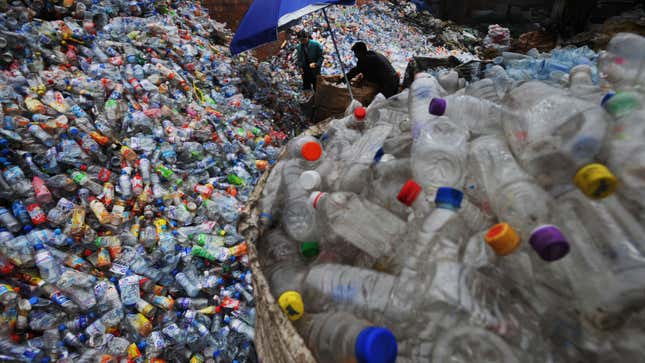
President-elect Joe Biden has promised to decarbonize the U.S. electricity grid by 2035 and implement a host of other climate policies, which in theory would discourage fossil fuel companies from extracting more oil and gas. But instead, it could just push them to find other uses for their products: Specifically, plastic—unless his administration comes up with a plan to stop them from doing so.
The industry is already banking on plastic to save itself amid decreasing fuel demand and an increase in sustainable energy policies around the world. According to the International Energy Agency, plastic and other petrochemicals currently account for 14% of global oil use. But if growth trends continue, they’re expected to drive half of the world’s oil demand growth by 2050.
Left unchecked, all that plastic will pose huge challenges for the planet, polluting the oceans and wreaking havoc on public health with toxic emissions from production plants and the incinerators and landfills used to dispose of it, all of which are often constructed in poor communities of color. It will also exacerbate the climate crisis: Conservative predictions show that plastic production and incineration will produce 300 coal plants-worth of greenhouses gases by 2030 and that by 2050, that pollution output could double.
Despite these clear impacts on the climate, public health, and nature, Biden hasn’t made many promises to quell plastic production. The president-elect’s climate plan makes no mention of plastic’s greenhouse gas emissions, only briefly acknowledging that ocean pollution poses a threat. On the campaign trail, Biden said the country should phase out plastic shopping bags, but didn’t say much else about curbing production.
“Plastic pollution has not yet been directly addressed by the Biden administration, but I am hopeful that they will recognize that you cannot solve the climate change crisis without addressing the production of plastics,” Judith Enck, a former Environmental Protection Agency regional administrator and president of Beyond Plastics, said in an email.
One of the first steps Biden’s administration could take to show it’s serious about taking on plastic pollution is to block the construction of a $9.4 billion chemical complex in Saint James Parish, a highly polluted part of Louisiana. The plant would be one of the largest plastic production facilities in the country. A ProPublica investigation found that the new plant’s emissions will more than triple residents’ exposure to cancer-causing chemicals, and the Louisiana Department of Environmental quality permitted the facility to release as much greenhouse gases as three and a half coal fired power stations. Since Biden has promised to create a new division of the Justice Department to focus on environmental justice and has otherwise pledged to center environmental justice in his presidency, his administration could put a stop to the project because of its projected effects.
“The water permit [for the proposed facility] is under consideration right now by the Army Corps of Engineers,” Anne Rolfes, executive director of environmental justice nonprofit Louisiana Bucket Brigade, said. “I would like the Biden administration to direct the Army Corps of Engineers to deny the permit based on the egregious impacts to the Black community in Saint James Parish.”
But stopping one facility isn’t enough to turn the tide. In December, the Center for Biological Diversity and more than 550 other environmental advocacy groups released a draft plastics strategy called the Presidential Plastics Action Plan, and called on Biden to adopt it. The plan includes suspending and denying permits for all new or expanded plastic production facilities.
‘There’s been a real attempt by [the plastic] industry to greenwash their role in the climate crisis,” Julie Teel Simmonds, senior attorney at the Center for Biological Diversity’s oceans program, said, noting that the industry has instead put the onus on individuals to clean up the mess through “better consumer behavior and better waste management.”
Of course, there’s basically no way the Biden administration could completely stop all plastic production over the course of just four years. That means it will also have to start working on policies to sustainably dispose of the plastic already out there. In practice that means ending chemical recycling and incineration, both methods that create toxic pollution that most often plague poor communities of color. Instead, the Presidential Plastics Action Plan suggests that regulators to work with the National Institute of Standards and Technology to set minimum recycled content standards for single-use plastics, and charge the Environmental Protection Agency with creating better systems to track how much cities, states, and companies are actually reducing their plastic consumption and improving their recycling programs.
These actions, the groups say, are all possible even without the support of Congress. But with Democrats controlling the Senate and the House, there’s even more the administration could do to urgently curb the plastic crisis.
“Congress could unleash more dollars for research and development for better recycling and reuse programs and other things. That is much easier when you have the branches working together,” Simmonds said.
Though Biden hasn’t put much focus on the plastic crisis yet, if he’s serious about curbing the climate crisis and boosting environmental justice, he will have to do so. Denise Patel, U.S. program director at the Global Alliance for Incinerator Alternatives, said his administration should make it a major priority from day one since environmental pollution from plastic plants and incinerators could also make nearby communities more vulnerable to covid-19.
“We’re seeing that covid-related deaths are really high in Black and brown communities across the U.S., particularly because a lot of these communities have pre-existing conditions that relate back to polluting industries like fossil fuel extraction, plastics production facilities, and waste burning,” she said. “This is an opportunity for some bold action that could immediately improve public health, and the Biden administration should take it.”